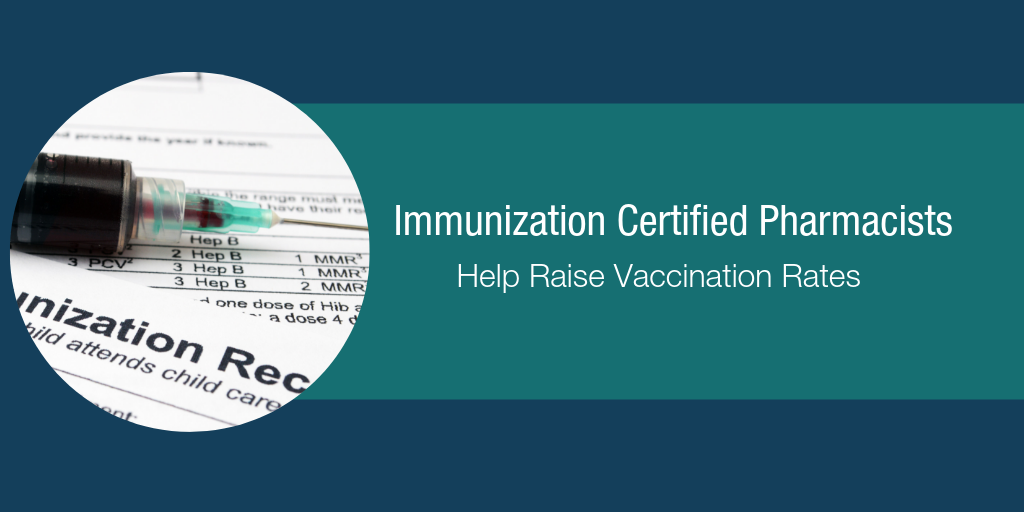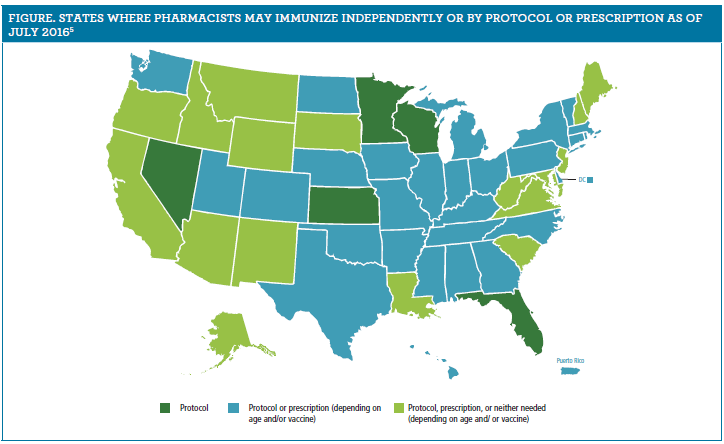
In 1994, the first organized immunization training for pharmacists was held in Seattle, Washington. Then, in 1996, the American Pharmacists Association (APhA) created the Pharmacy-Based Immunization Delivery program which was endorsed by the CDC. The program teaches pharmacists the basics of immunology, the skills to become a primary provider for immunizations, how to provide vaccine education, and the legal and regulatory issues related to vaccinations (Pharmacy Times).
Receiving vaccinations is still the choice of the patient, but healthcare professionals play a major role, pharmacists included. Pharmacists are often easily accessible for patients and they can educate them on both the benefits and the risks related to immunization and lack of immunization.
Although pharmacists are one of the most accessible healthcare professionals, they are often underutilized when it comes to raising vaccination rates across the United States. A study published in 2017 in Clinical Therapeutics, reflected that states which allowed pharmacists to administer vaccinations increased the odds that an adult would receive an influenza vaccine from 32.2% to 40.3% in 2013 (Pharmacy Practice News). That said, states have different regulations around what vaccines pharmacists can administer and under which model they may do so. ASHP advocates that states move to a more streamlined approach and enable all pharmacists to vaccinate.
Allowing pharmacists to vaccinate improves vaccine accessibility for the public. In a recent article, Dr. Anna Legreid Dopp, PharmD mentioned that 92% of her patients live within a few miles of a pharmacy. The pharmacy’s close proximity to the public makes it a convenient place to get in-person advice and education on vaccines (Pharmacy Practice News).
Variability of State Laws, Regulations & Practice Models
As of today, all 50 states allow pharmacists to provide vaccinations, however, significant differences in regulation limit which vaccines are permitted to be administered, which age groups of patients can be immunized, and which practice model pharmacists may operate under. Many states allow pharmacists full independent practice, but not all states do. All pharmacists graduating today receive standardized training on immunizations, yet some states such as Maryland, only allow pharmacists to administer influenza vaccines to patients 9 years or older, and a prescription is required based on age for some of the other CDC recommended vaccines (Pharmacy Times). As pharmacists continue to demonstrate their expertise and competency, states are likely to continue expanding their scope of practice.
Figure 1: Image Credit: Pharmacy Times

Pharmacy Based Immunization Delivery Certificate Training Program
The American Pharmacists Association (APhA)’s Pharmacy-Based Immunization Delivery Certificate Training Program is commonly used to train pharmacists on national immunization standards and recommendations set by the CDC. At present, more than 280,000 pharmacists have been trained to immunize. All 50 states, the District of Columbia (DC), and Puerto Rico allow for pharmacist-provided immunization in some capacity (Pharmacy Times).
Although not all pharmacists will elect to obtain the certification needed to administer vaccinations, pharmacists who do not administer vaccines also have an important role in promoting the importance of immunization in other ways, which include (Pharmacy Times):
- history and screening of patient
- patient counseling
- documentation
- formulary management
- administrative measures
- public education and awareness.22
Other Blogs You Might Be Interested In...
- Providers, do your Part in Preventing the Spread of Influenza this Season
- Is Vaccine Refusal Leading to Preventable Disease Outbreaks?
- 14 Diseases You Almost Forgot About Thanks to Vaccines
- Vaccine Refusal Leading to Measles Outbreak
Giving pharmacists the ability to administer the CDC recommended vaccinations will play a huge role in increasing vaccination rates. ASHP continues to push and advocate for pharmacists across the country to provide this valuable healthcare service. With more and more pharmacists graduating with immunization certifications, vaccinations will become more accessible for patients of all ages. The goal continues to be policy change to level the playing field across state borders so that pharmacists can initiate and administer all CDC-recommended vaccines.




